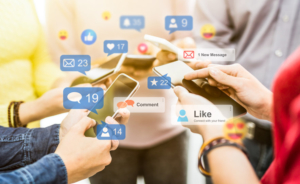Small businesses are increasingly turning to artificial intelligence (AI) to enhance their social media strategies. Social media AI involves the use of machine learning and data analytics to optimize various aspects of marketing campaigns, from social listening to content creation and advertising. This article explores the diverse ways in which AI can be harnessed for social media marketing, providing valuable insights for small businesses aiming to promote and grow their online presence.
AI and social media form a perfect partnership, enhancing productivity and performance for marketers across platforms. Today, AI tools analyze audience behavior, predict resonant content, automate post creation, and discern trends and sentiments. Every social media platform utilizes AI to curate feeds, moderate content, and suggest relevant content and accounts. While AI enriches the social media experience, it introduces challenges in aligning content with both human preferences and algorithmic demands.
Social media professionals excel in understanding human dynamics, capturing attention, and building authentic connections but often struggle to decipher algorithmic preferences. Paradoxically, AI facilitates more authentic and human-centric social media marketing by extracting valuable insights from the vast data platforms provide. It interprets user interactions, tailoring content to audience preferences, saving time, and enhancing efficiency.
Leading social media marketers leverage AI to:
1. Automate tasks, reducing costs and time spent on routine social media management.
2. Scale strategies across platforms efficiently.
3. Create data-driven posts and campaigns that yield results.
Understanding AI basics is crucial. Demis Hassabis, CEO of DeepMind, succinctly defines AI as the “science of making machines smart,” enabling them to mimic human intelligence in tasks like seeing, hearing, speaking, moving, and writing. AI, driven by machine learning, empowers machines to make data-driven predictions, enhancing accuracy over time without direct human intervention.
AI’s benefits in social media include accelerating revenue by learning audience preferences, predicting user actions, and targeting messages effectively. Simultaneously, AI reduces costs by automating content creation, resizing creative for different channels, and optimizing ad targeting.
AI is integral to popular social networks, influencing content serving, face recognition, and ad targeting. While AI operates discreetly on these platforms, marketers can harness commercially available AI tools for social media monitoring and marketing across various applications.
Key ways social media marketers use AI include:
1. Analyzing post-performance to identify effective content.
2. Using generative AI to write compelling social media posts efficiently.
3. Automatically creating posts from existing content, enhancing scalability.
4. Generating video snippets from longer content, catering to video-centric platforms.
5. Monitoring brand mentions and sentiment to manage reputation effectively.
6. Optimizing posting times based on audience engagement patterns.
7. Predicting the viral potential of content using historical and network data.
8. Optimizing and managing social media ads, including AI-generated ad content.
Effective Tips on Excelling in Social Media Marketing with AI
1. Social Media Listening
AI’s social media marketing prowess shines brightest in social listening. This proactive strategy involves tracking mentions, assessing brand presence, analyzing competitors, and identifying keyword trends across platforms. Manual tracking at this scale is time-consuming and error-prone, underscoring AI’s efficiency gains.
AI tools swiftly analyze vast data, informing strategic planning with valuable insights. Leveraging social listening through AI gives businesses a competitive edge by staying attuned to online conversations and adapting strategies accordingly. Notably, AI marketing stats show that top-performing businesses are twice as likely to use AI, highlighting its crucial role in the competitive social media landscape.
2. Strategy & Content Planning
AI plays a pivotal role in shaping social media strategies and content plans. Traditionally, marketers relied on trial-and-error methods to identify effective strategies. However, with the advent of AI tools, businesses can leverage predictive analytics and past data to tailor marketing strategies specific to their brand.
Utilizing AI-generated insights enables businesses to fine-tune their social media copywriting and content creation, ensuring that each piece aligns with overarching marketing goals. This approach enhances the efficiency of social media planning, leading to more targeted and successful campaigns.
3. Automated Posting
Automated posting using AI-assisted social media schedulers offers a range of benefits for small businesses. These tools save time by eliminating the need for manual posting and utilize audience behavior and platform insights to determine the optimal posting times. For instance, Feedhive offers extended functionality, such as auto-retweeting and recurring posting plans, which are managed by AI to ensure maximum engagement.
Additionally, AI-driven platforms provide performance predictions, helping businesses gauge the expected impact of their content. Automated posting with AI enhances efficiency and maximizes the reach and engagement of social media content.
4. Caption Generation
Crafting engaging social media captions can be time-consuming, but AI has emerged as a valuable ally in this regard. Various AI content marketing tools, including those integrated into popular platforms, assist in generating compelling post captions.
AI marketing stats reveal that over 44% of small businesses are already using AI for content creation. These AI writing tools cater to diverse purposes, offering a time-efficient solution for businesses seeking engaging and creative captions for their social media posts.
5. Image & Video Media Generation
Generative artificial intelligence extends its capabilities to creating text, images, videos, and other media. Tools like ChatGPT (DALL-E2) enable businesses to generate original images and videos without the need for photographers, videographers, or graphic designers.
DALL-E2, a text-to-image generator, creates diverse iterations of AI-generated artwork based on textual prompts. Fliki, on the other hand, facilitates the creation of videos from texts or existing content. These AI-powered tools cut down on costs and empower businesses to produce visually appealing and original content for their social media channels.
Pro-Tip: Use chatGPT for social media workflows. It will help to complete many tasks quickly without using any paid tool.
6. Social Media Advertising
AI’s influence in social media doesn’t stop at organic content; it extends to paid social advertising. Tools leverage data to automate ads, predict budget allocations, and personalize ad content across various platforms. This level of automation enhances efficiency and ensures that advertising efforts are data-driven, leading to improved returns on investment.
Conclusion
Integrating artificial intelligence into small businesses’ social media strategies has revolutionized efficiency and effectiveness. AI is essential in social media for tasks like social listening, content planning, and automated posting. It combines human creativity with AI-driven insights for success, ensuring competitiveness by analyzing real-time data, predicting user behavior, and automating tasks.
Businesses leveraging AI in social media witness transformative impacts on marketing efficiency, audience engagement, and overall brand success. Embracing AI tools provides small businesses with a sustained competitive advantage, marking a paradigm shift in how brands thrive in digital marketing.




